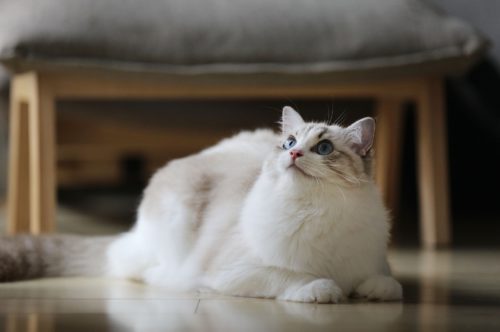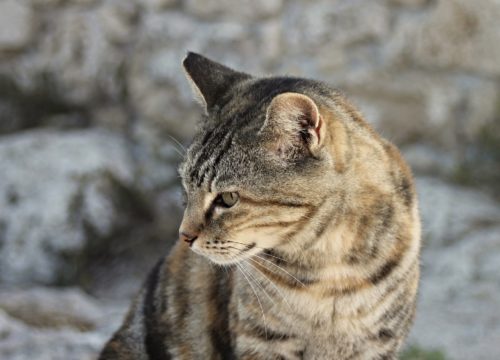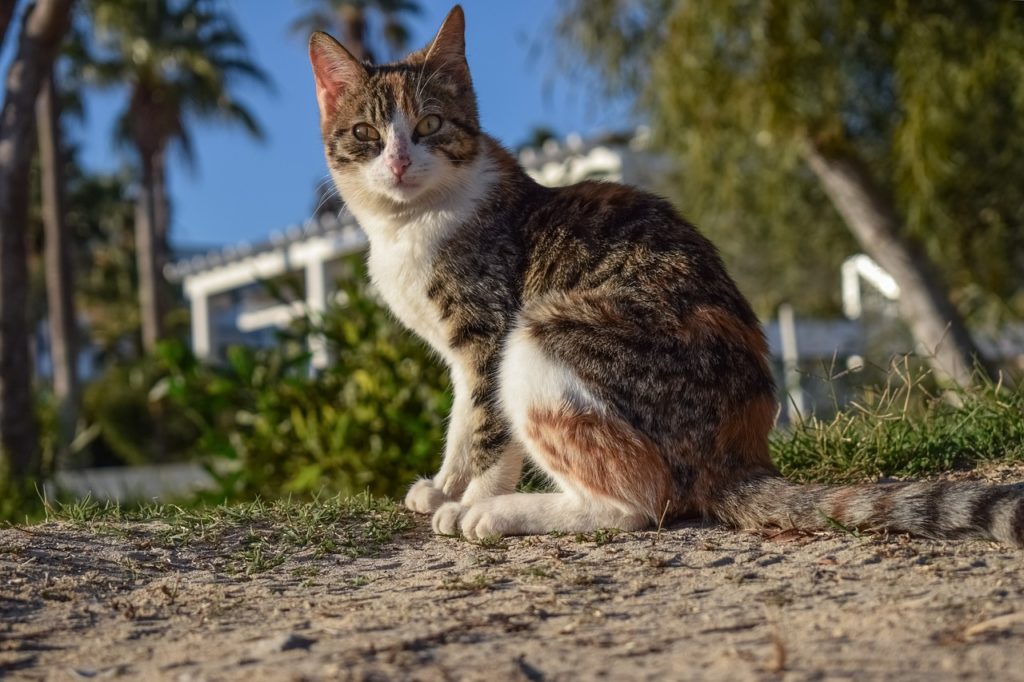Inflammatory bowel disease, or IBD, in cats is not one single disease; rather, a group of chronic gastrointestinal disorders. These disorders are precipitated when inflammatory cells infiltrate the walls of a cat’s gastrointestinal tract. When the infiltration occurs, the wall of the gastrointestinal tract thickens, disrupting the intestine’s ability to function properly.
Chronic inflammation of the gastrointestinal tract can occur from an underlying disease like an infection or food allergy. However, the cause of feline inflammatory bowel disease is mostly considered idiopathic—that is, “unknown”. Genetics, nutrition, infectious agents, and abnormalities of the immune system have all been found to contribute to IBD. Age can also play a role, as the disease often occurs in cats middle-aged and older.
Depending on the type of inflammatory cells and the region of the gastrointestinal tract involved, IBD can present itself in various forms. The most common form of this disease is called lymphocytic-plasmacytic enteritis. This form involves an inflammatory infiltrate made up of lymphocytes, or small white blood cells, and plasma cells, cells which produce antibodies.
One way you can tell where the disease takes place is the name. Enteritis, such as lymphocytic-plasmacytic enteritis, takes place in the small intestine. Gastritis involves the stomach, and colitis is when the colon (large intestine) is involved.
Symptoms of Inflammatory Bowel Disease in Cats
While some cats show obvious symptoms of IBD, like vomiting with each meal, others may show symptoms much less frequently, like producing hairballs once or twice a month.
The common symptoms of inflammatory bowel disease in cats to watch out for include:
- Vomiting

- Weight loss
- Diarrhea
- Lethargy
- Depression
- Varied appetite, from refusing to eat (anorexia) to overeating
- Gas (flatulence)
- Abdominal pain
- Abnormal sounds from the abdomen such as “gurgling”
- Bright red blood in the stool
- Distressed coat hair
Causes of Inflammatory Bowel Disease in Cats
The cause of feline inflammatory bowel disease is considered idiopathic. Although no single cause is known, more than one cause is often suspected.
Suspected Causes include:
- Hypersensitivity to bacteria
- Genetic factors, and
- Specific food allergies
Food Allergens linked to IBD include:
- Meat proteins
- Food additives
- Artificial coloring
- Preservatives
- Milk proteins
- Gluten (wheat)
Refrain from eliminating any foods from your cat’s diet before a proper diagnosis and treatment plan. Your veterinarian will work with you to ensure your cat is being fed the proper diet for his health.
Diagnosing Inflammatory Bowel Disease in Cats
Visit your veterinarian if you suspect your cat has inflammatory bowel disease. IBD is uncomfortable and sometimes painful, and the sooner you can manage this disease, the sooner recovery can begin.

Come prepared with a thorough history of your cat’s health, along with any observations around the onset of symptoms, such as duration and frequency. Along with a complete physical examination, your veterinarian may order a complete blood count (CBC), biochemistry profile, and urinalysis.
The veterinarian may also conduct a fecal examination to verify any parasitic infections, check cobalamin and folate levels in the blood to evaluate small intestine functions, as well as order X-rays.
In addition, Barium Contrast Studies may be ordered for a more detailed evaluation. Barium enhances the visibility of the organs and is given before X-rays to study intestinal wall abnormalities.
In some cats, anemia and a higher count of white blood cells than normal may be present. Cats with IBD are also known to show abnormal levels of proteins and liver enzymes.
Treating Inflammatory Bowel Disease in Cats
In most cats, IBD cannot be “cured”, but it can be managed. Because relapses are common even after recovery, the major goals of treating this disease include stabilizing body weight, addressing gastrointestinal symptoms, and ameliorating the immune system.
The two most common therapies include dietary management and medical treatment:
Dietary Management
If your vet suspects a food allergy, he may recommend a food trial using protein and carbohydrates the cat has never eaten before. Hypoallergenic foods such as rabbit, duck, and venison-based foods are often recommended.
If symptoms do not improve, your vet may recommend other diets. Diets high in fiber, low in fat, and easy to digest have been found more tolerable in cats with IBD.
Food trials can take several weeks before you start noticing any changes.
Medical Treatment
In the case of IBD, corticosteroids are most often prescribed. Corticosteroids are anti-inflammatory, immunosuppressive medications which can help reduce symptoms.
Managing Inflammatory Bowel Disease in Cats
The short-term prognosis in most cats with IBD is excellent, but if the disease is severe, the prognosis is usually very poor. Be patient with the treatment recommended by your veterinarian and follow the diet recommendations. Although IBD cannot be “cured”, it can be successfully managed, leading to a healthier, happier life for your cat and, subsequently, you.




